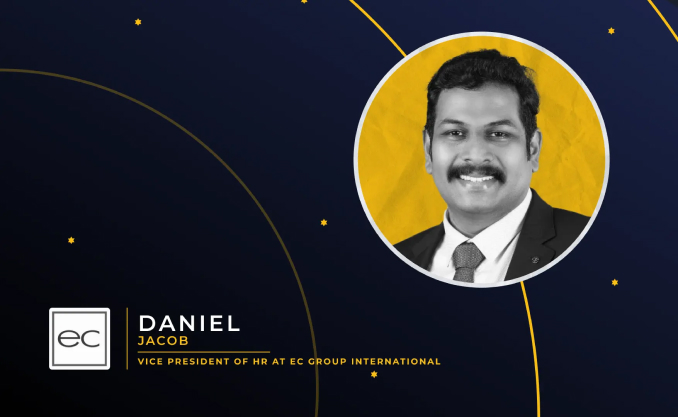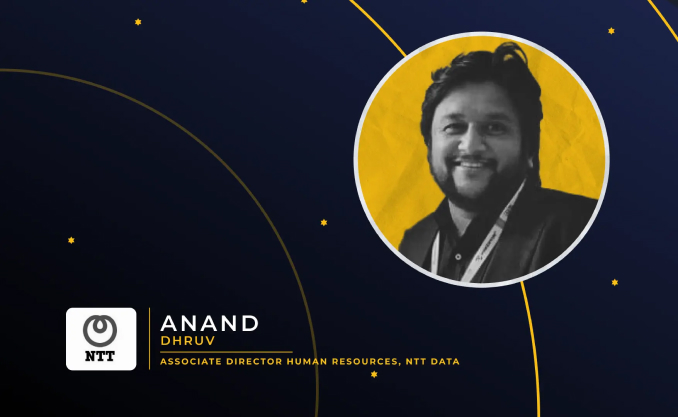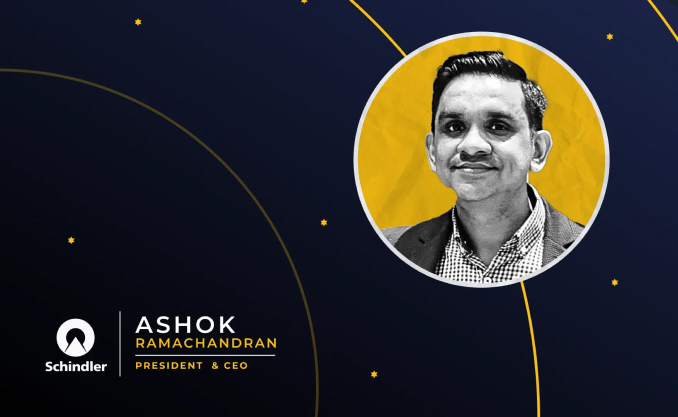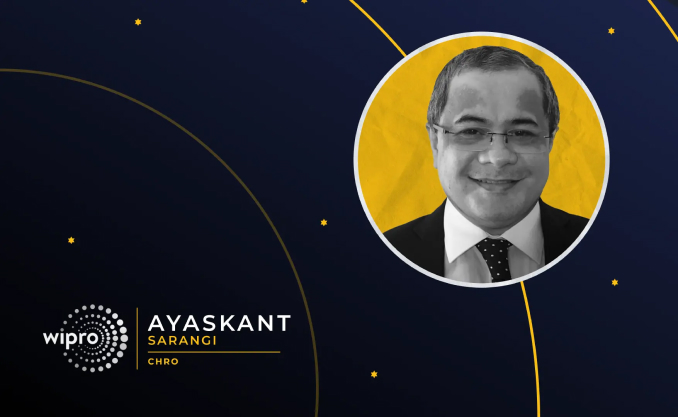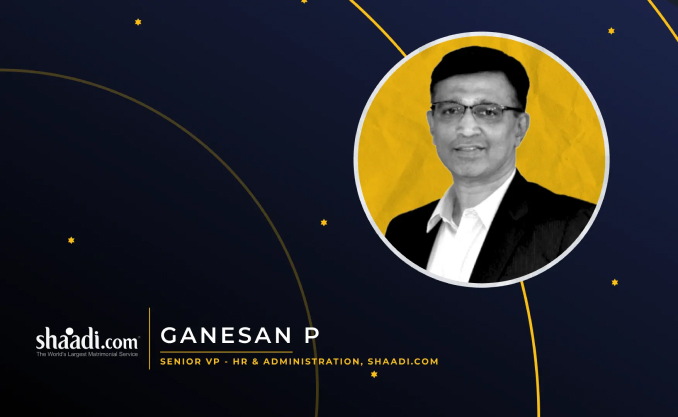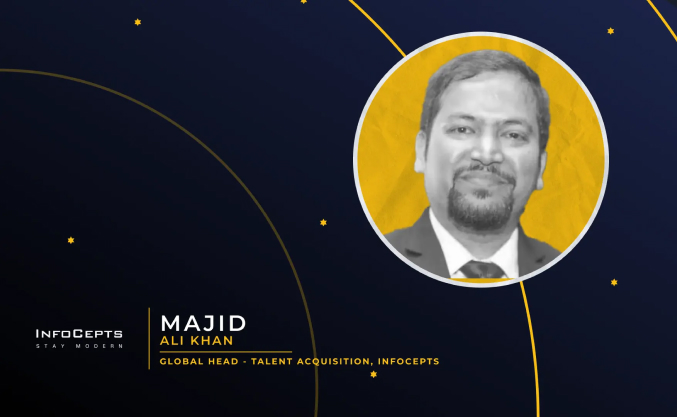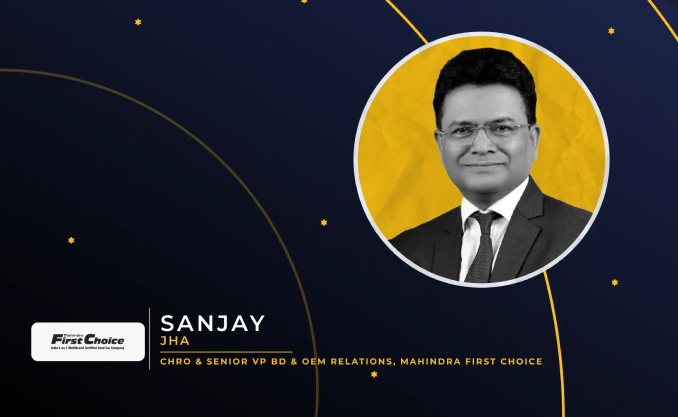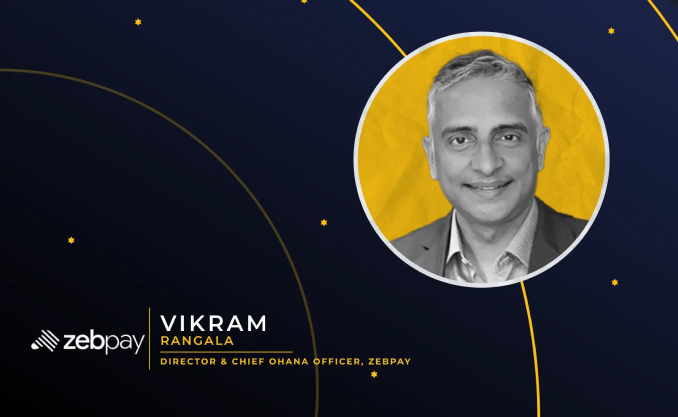Daniel has a total of 17 years of experience in the HR industry and became a part of the EC Group as the junior recruiter during the initial phase and is now the vice president of HR operations at EC Group.
When asked about the most motivating factor of being an HR leader, Daniel mentions, “My motivation is very basic. This job helps me meet people. I meet with people, so I understand different personalities. I enjoy working with people”
Daniel Jacob believes that people are people and we need to give them respect at all levels irrespective of the position that they intervene for, even within the organization. Responsibilities may change but people need to be provided respect.
Table of contents
- About Daniel Jacob
- Motivating factor being an HR leader
- Problem in EC as an organization
- Remote hiring and quality sourcing
- Automated interviewing tools used by EC Group
- Bad interview experience
- Embracing technology in HR in India
- Time management and a typical day perspective
- Tools used for productivity on a daily basis
- Advice to younger HR professionals
About Daniel Jacob
Daniel Jacob is the vice president of HR in an IT services company named EC group in Chennai. EC Group is an American-based company of which Daniel has been a part for the past 17 years. He joined as a junior recruiter and currently is the HR operations head apart from being a part of the management team. Daniel completed his MBA in HR and after which he went on to start his job at EC Group.
Daniel claims,
“HR is my passion. That’s how I ended up here. So, I enjoy whatever I do. As an HR the value that we are able to add to individuals, help them grow, and understand their potential is what I like the most. All that is what gives me the reason to come to work every Monday morning.”
The most motivating factor of being an HR leader
Most motivating part of HR
According to Daniel when asked about the most motivating factor, he claimed,
“My motivation is very basic. This job helps me meet people. I meet different people as a candidate, employees, customers, vendors, and so on. So I meet with people and I understand different personalities. I enjoy working with people, I gain energy being with people. So meeting people can happen anywhere, right? What is special about HR that I really enjoy is that it is not just about meeting with people but I’m also adding value to every person that I meet. Maybe as a candidate, I meet. And it’s not just an interview, but I also try to see in what way I can add value. Whether that person is selected or not, that’s different. But spending the 30, 45, or 60 minutes with that one person, what value I’ll be able to add to that person gives me that purpose.”
He also adds on,
“Secondly, with employees, we get some longer period, right? A company like as I said, I work here for 17 years and most of our employees also work long term with us. So I have bigger tenure with many people.
And when people come in and the difference between what they learn here and the difference that we are able to see when they go out, when they go out to a bigger organization it gives us that joy. This means that we got the opportunity to invest our time, create, help them understand their potential, and develop them. That’s what actually gives me my purpose every day in doing this job. ”
The key problem that the EC group as an organization is trying to solve.
When asked about the key issue that both EC Group and the HR community as a whole has been facing, Daniel replies,
“We need to deal with people and it is entirely different than dealing with machines. And people are complex, right? So there is no one solution that fits all problems. The solution that I gave today might work for you, but tomorrow it may not work for you.
And so I need to agree with myself and come up with reasons and ways in what way we’ll be able to give a solution for that problem that day. So that’s how every day gets us excited.
But right now it’s not just about the EC group, I’ll say the entire HR industry in India also many other western countries facing is the hotness of the job market in the US. They call it the great resignation. I was wondering what should we call it in India. It is not a great resignation. I will say I think that it’s a great talent hunt. Right now it’s like a pressure hunt.
A talent hunt is going on because every individual that I meet with now on the first discussion itself, they are very open in telling us that they already have five offers and they are interviewing for the 6th offer. So with the resources available, every company is trying to hunt them. In the olden days, we used to call this hit hunt. It’s like targeting one person and it is now everybody’s like that. It’s a common problem in the industry and EC Group also.
How we as HR can add value in this difficult time is a challenge that we face as an HR function in the company. And there are so many things that can be done. So that is what actually keeps us motivated on a day-to-day basis.
How can we do it? See, when somebody’s got five offers and they’re now looking for more offers, I’m sure they’re not stopping with us. They’re going to be looking for more offers, right? What differentiator are we able to show to a candidate that matters along with the way we treat them during this process, in the way we respect them, is all that matters, right? There are so many things different companies use and different things work for different companies. So that’s one big challenge that we face.
Talking about other big challenges that are faced by EC Group, Daniel Jacob points out,
“The second challenge is kind of combined with the same challenges as mentioned before. When the job market is so hard, how do you retain your people? Any candidate that you meet might have multiple offers in their hand and the same goes for other employees. So how can we make them continue their interest in EC Group? That is a big challenge we have been facing. We have tried various things.
I’m sure every organization I know and all my friends work for, also tried the things that we tried in our company, which kind of worked for us. In the last two quarters, we have not had any resignations. Even in the past year, we had less than 10% addition. So things are working out better now.
It is not something new in HR, retaining people and recruiting people, have always been the two most commonly faced challenges.
But right now, because of the industry dynamics, there’s more pressure on it.”
Remote hiring and quality sourcing in the HR industry by the HR leaders
Quality remote sourcing and hiring
Daniel claims that due to recent competition the candidates who had previously been working with a said amount of salary are now claiming to get two times the said salary. When this claim is raised to the management, they question about the candidate’s ability be able to work equal to the amount that is being paid. This means that the candidate might not be able to work that much and hence it becomes hard to provide that high of a salary.
It is hence a big challenge to the company as the candidates are trying to ask for 2 times the salary while providing productivity of just about 0.5 times the salary. Also while mentioning some of the other remote hiring issues Daniel claims,
“We have seen a number of fake candidates like never before. Just putting a particular skill on your CV and just going through a few YouTube videos to get a glimpse of it is what most candidates are doing nowadays. We see a lot of fake candidates.
Secondly, we also have a lot of proxy candidates taking interviews. A proxy candidate is like if you’re a candidate, you are the person who has been invited for the interview. But somebody else is attending this interview for a bigger position for you.
In a big organization, at different levels, different people meet. For example, in a position in Gurgaon, people from Chennai and Hyderabad might turn up for the interview. And the person in Gurgaon will speak and say this candidate is great and he’ll give his approval. The HR who’s processing will be sitting in Mumbai and doing all this work. And they will not know that this is a fake candidate, right?
Fortunately, we are now a smaller company and we are able to do it.”
Providing an example regarding the fake candidate condition, Daniel Jacob says,
“I’ll give you an example. Once when we came to the final interview stage, suddenly this candidate is speaking very well. And he used to have very bad English previously in the first level that he spoke to HR. But suddenly in the last interview stage, this candidate is very good at English. Then we tried kind of probing into this. Then we realized that his team leader was the one who was actually taking interviews for the candidate. And when we found all this and actually got them red-handed, the answer that the candidate gave me was very shocking.
He said, sir, everybody is doing the same thing. Why are you only catching me now? Please leave me. I have a family, I have children and sisters. I need this job, I have the responsibility of getting my sisters married and all that. He’s actually begging now. Everybody is doing, my friend did the same in this company, then why are you only catching me? Because when this happened, I wrote him a big mail saying – see, you’re not only spoiling your image, but you’re spoiling our country’s image.
Because most of us work for customers from a global industry. When this happens, you’re spoiling our country’s name. And no, I told him I’m going to take this seriously. I’m going to now mark you as a fake candidate. And then he called and started crying, saying please don’t do it. I did not know what to do. So it is shocking to know how many more such candidates are sitting there and working and we do not know. That’s another big thing. And it is not one, or two candidates that we come across. We come across many candidates and it is increasing now in all the organizations. The need for talent has also increased and there are more people looking for them. They’re demanding more, the quality is less. We do not know whether they are real candidates or not.”
While concluding his statement Daniel claims,
“With all these challenges the responsibility of the recruiter towards the business is increasing. It is not like I have a 3% close this month and I got to close and get my incentive. We cannot work on that model anymore. I need to feel part of the business and the vision of the business and see whether this candidate can be a good candidate or not. Fortunately, in a country like India, we do have more candidates. The only thing we need is time to actually work on that.”
Use of automated interviewing tools by EC Group which helps facilitate the interview process.
When asked about the automated interviewing tools that are used by EC Group, Daniel speaks up,
“Not fully, in a way, kind of a half of it is automated, but not on a big candidate identification level. And I’m sure now tools might have features of using facial recognition and all that.
Because I’ll tell you another example where a candidate is attending an interview. There is one candidate who’s actually got the headphone and actually answering and this guy is only reading. It was a recorded interview. And even then I’d say the noting difference was very difficult for us. I think they’re becoming professional. Maybe there are some courses they have on how to not give lip movements for the candidates for the interview and so on. It was very tough like that. But technology can be a good solution for that. Right now we are not using any such tools.”
Dealing with a candidate who has a bad interview experience
Dealing with unhappy candidate experience
Dealing with a candidate who has had a bad interview experience can be tough work, especially in the HR field, however when asked about this, Daniel claims,
“We kind of brought it into our DNA that people are people and we need to give them respect at all levels irrespective of the position that they intervene for, even within the organization.
Responsibilities change. But people are people treating them with the utmost respect is what we feel. So we have a very good candidate experience. We always do it.
I think the main reason is that from day one, the person who joins us as a recruiter or people who join us, we make sure that we treat people with dignity, we don’t treat them differently. When I interview somebody, I’ll make sure that irrespective of whether the candidates are selected or not, I’ll see that I add some value to that person during the discussion. It may be something that they need to improve. Maybe something they have taken the wrong decision on, or maybe they’re not doing things right or something like that.
Even a mistake that I see on the receiving end, I take the extra time in helping them understand why it is important they do it the right way. I have not had any bad experiences with anybody saying they have got a bad candidate experience. Because one of the places where the candidates get really frustrated is when you don’t respond to them when you tell them no, I’ll get back to you, and don’t actually get back to them. Several years back we also had that problem however, now we got to fix it. And it is better that the candidate is actually given the news that they are not selected as soon as possible. We also include some templates that help us communicate faster.”
Rate of embracing the technology in HR in India
Adoption of technology in Indian Market
When talking about the adoption of technology in HR, especially in a place like India, Daniel claims,
“During one of the interviews like this, one person asked who is the digitalization champion in our organization. Is it your CEO or it’s your COO or the head of HR? Then I said no, the real champion is COVID. So we did not have any option. Right now most companies are doing remote interviews almost always or a majority of the time. This facility was not previously available. And now remote interview is not an option.
You cannot ask candidates to come for different levels of interviews and that is not possible. Whether I like it or not, whether it works out or not, it doesn’t matter because it will not work. Candidates will not come. So post-COVID, it is not an option, it has become mandatory. Right now if we were in a pre-COVID situation, this interview would have been a face-to-face interview. So now everything has changed.”
Also talking about the technology in business and how it has helped, Daniel says,
“Technology helped us survive in business otherwise you would not have survived in business. So I think the recent technology-based hiring company managers knew in 2019 that COVID is coming and started this business. Right now kind of people use a lot of recruitment tools for everything right from talent acquisition to candidate experience onboarding, even tracking collectively pulling from all the social media recruitment and so on. I think the awareness is more than before and also the willingness is also more because people have felt the benefit of it.”
Time management based on a daily basis and the perspective of a typical day or week
Allotting time and planning tasks
Daniel when talking about time management claims,
“HR is one department where you can do a lot of planning but when it doesn’t go as you plan, you cannot be upset about it because you are there to deal with people’s problems. You don’t know that this person is going to come and discuss with you his resignation today. You cannot tell him to get his resignation and come on Friday afternoon at 03:00 and we’ll talk about it then. No, it’s a business problem, we’ll have to do it then and there.
The priorities are supposed to be kept accordingly. And it does not mean that we should not have a plan. We need to follow some process where the scheduled meetings are happening with everybody and every week people of different groups meet at different timings, every meeting, for example, a marketing team, HR team, management team, and the leadership team come together. All of these interactions allow members to bring forth their issues for the discussion and it’s discussed and it’s solved once and for all. So that’s how it is and we set to-dos.”
Talking about his free time and how he spends it, Daniel claims,
“I also run an NGO. I’m also a part of different boards as directors and trustees. Other than this, I work for about 40 hours a week in the office, and I need to spend another at least 20 hours outside. Especially being an HR, another blessing I see is giving speech sessions in colleges, forums and so on which helps a lot in the daily interaction with people. And thankfully COVID helps us do all these remotely. Now I don’t need to travel much, otherwise I remember during pre-covid times, most Saturdays I used to be getting this first flight for which I needed to get up at 03:00 a.m. And travel and get there.
COVID enabled us to do so many meaningful services to the people who are in need in those times. So with all this, I don’t feel that I’ve ever run out of time. I think we have a good team that works better, so they don’t give us much trouble.
So in a nutshell, I’ll say without planning, segregating your time efficiently is not possible.
I think when you get up early in the morning, go to your journal, write it down, and expect that this is probably how your day is going to be. And also expect how unexpected my day is going to be.”
Three productive tools that are mostly used on a daily basis to keep on top of all things.
3 most productive tools
Daniel Jacob when asked about the three productive tools that are used on a daily basis claims,
“The number one for me is the calendar. You can just add in your upcoming meeting or any event there and with the technology advantage of giving you notifications it’s amazing how you can stay on top of all your tasks.
Obviously the managers most of the time go to Excel, irrespective of whether you’re preparing for your annual meeting or negotiating with the candidate or employee for their salary.
There are also a couple of other tools for fun, for the process that we use called an entrepreneurial operating system, for which we use a tool where it helps us manage all our meetings, to-dos, responsibilities. It helps us with an accountability chart and what we call a rock project that we are working on.
So you know another fun tool that I like is a tool called Canva, it helps me put my mind together and create designs. When you feel bored, when you want to convey something effectively, especially while preparing a presentation Canva is very helpful. Yeah, I think the flexibility, it’s kind of a sandbox where you can try different things.”
Advice to young HR professionals
Advice to HR professionals
While providing advice to the young HR professionals, Daniel Jacob says,
“I’ll think of some advice that I wanted to give to myself.
I will say – enjoy the process. Because people are the most valuable asset that we can find in this world and we are privileged to work with them. And it is easy to find fault.
It is easy to kind of get into an operational mode and just do it day in and day out; but start enjoying it. I think when I started doing that, I didn’t feel like I’m working anymore. I don’t feel that it’s an obligation. I don’t feel that, oh, when is that Friday evening coming? I don’t feel that at all. Because when we feel that it is our calling, I feel that HR is my calling.
Everybody that I meet is more than what we see during the first impression, it gives me an opportunity to listen because I’m not here to just speak to them and convince them, but I’m here to understand them. I understand them most of the time and I’m really able to give the solution. So that gives me satisfaction and an opportunity to enjoy this job.
So my one piece of advice is that keep enjoying what you are doing because you are dealing with some very precious group of people.”

